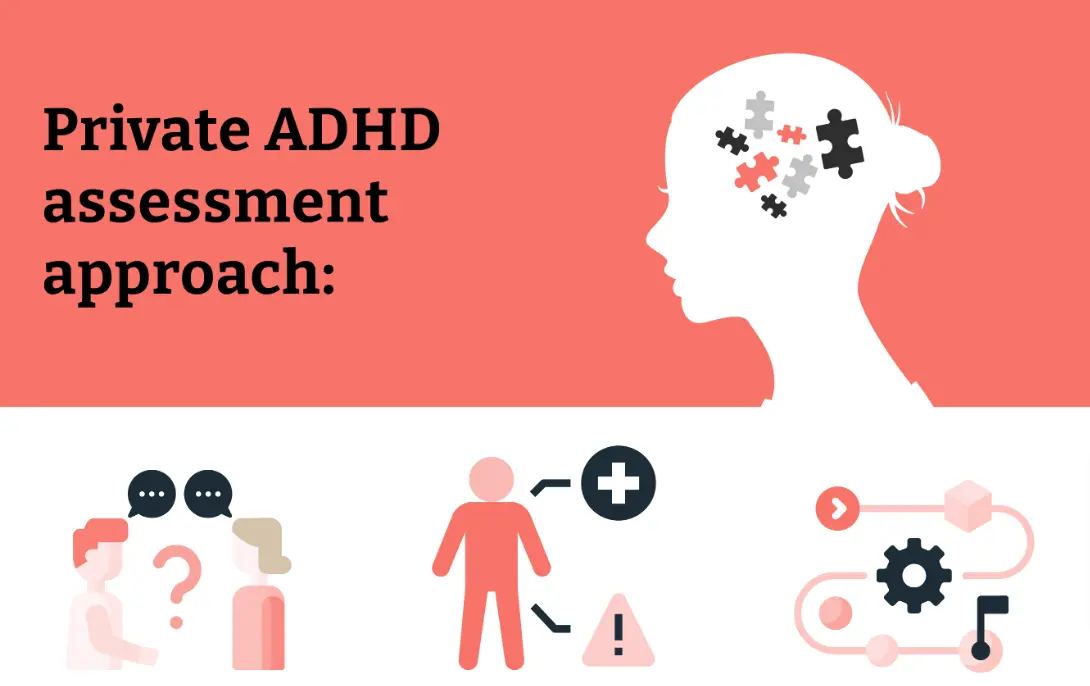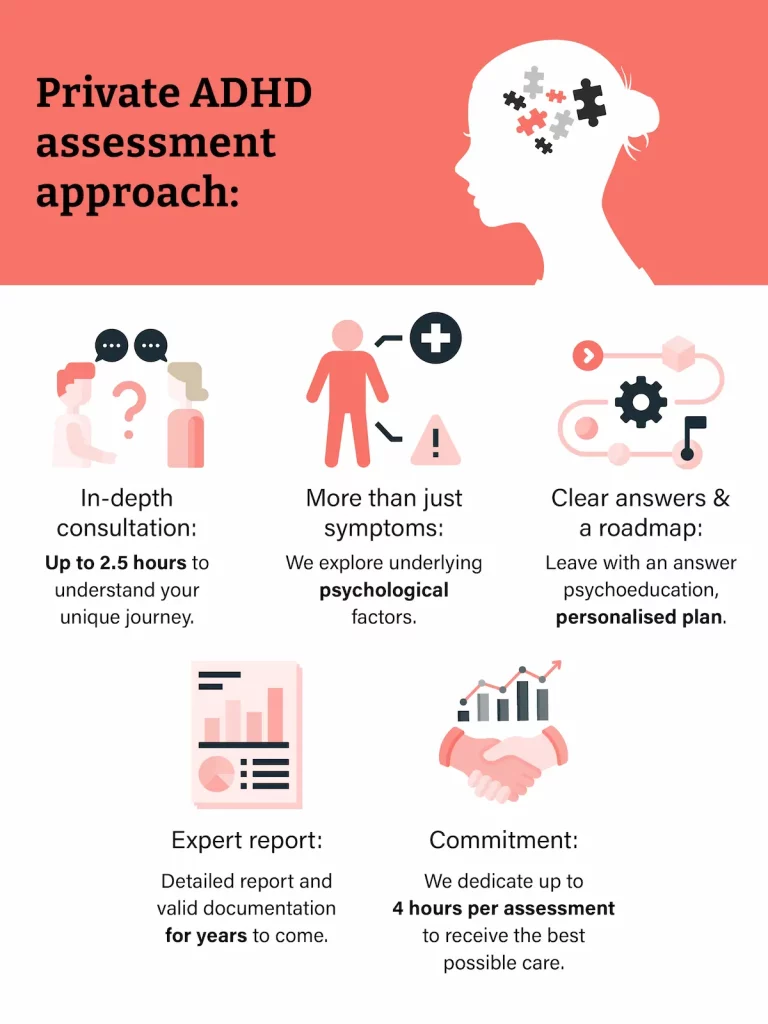
Living with undiagnosed or misunderstood ADHD can be a constant uphill battle. Struggling to concentrate, feeling restless and impulsive, and facing criticism for behaviours beyond your control can take a toll on every aspect of your life.
For parents, the frustration of watching their child grapple with ADHD symptoms can be heartbreaking. Seeing them fall behind in school, have difficulty making friends, and constantly be labelled as “disruptive” or “lazy” is a harsh reality that no parent should have to endure.
For adults, the challenges of navigating work, relationships, and daily tasks with undiagnosed ADHD can be overwhelming, leading to a sense of failure and low self-esteem.
Getting an accurate private ADHD assessment London is the first step towards unlocking a world of understanding, support, and effective management strategies. By finding the right ADHD expert, you or your loved one can finally receive the personalised care and treatment needed to thrive in all areas of life.
This guide will show you how to navigate the process, identify the key signs and symptoms, and most importantly, find the perfect ADHD specialist in London to help you or your child reach their full potential.
What is ADHD
ADHD stands for Attention Deficit Hyperactivity Disorder. It is a neurological condition that affects a person’s ability to concentrate, regulate emotions, and control impulsive behaviours.
ADHD is generally diagnosed in childhood, but it can persist into adulthood. The key symptoms of ADHD include inattentiveness, hyperactivity, and impulsivity.
Children with ADHD often struggle to focus on tasks, follow instructions, and sit still. Adults with ADHD may experience difficulty with time management, organization, and completing projects.
ADHD can significantly impact various areas of life, including academic performance, work productivity, and personal relationships.
Getting an accurate ADHD diagnosis is crucial for receiving appropriate treatment and support.
How to find an ADHD expert in London
If you suspect that you or your child may have ADHD, the first step is to find a qualified ADHD expert in London.
This can be a daunting task, as many healthcare professionals offer ADHD assessments and treatment.
However, it’s essential to choose a specialist who has extensive experience and expertise in diagnosing and managing ADHD.
One way to find an ADHD expert is to ask for recommendations from your primary care physician or local support groups. You can also search online directories or professional organizations that specialize in ADHD. The key is to look for professionals who have specific training and qualifications in ADHD assessment in UK and treatment.

Choosing the best ADHD specialist
When choosing an ADHD specialist, it’s important to consider several factors. Look for a professional who has a proven track record in diagnosing and treating ADHD.
It’s also helpful to find someone who specializes in working with your age group, whether it’s children, adolescents, or adults.
During your initial consultation, ask about the specialist’s approach to ADHD diagnosis and treatment. A good ADHD assessment should include a clinical interview, rating scales, and cognitive testing.
The specialist should also consider other potential factors that could contribute to symptoms, such as learning disabilities or mental health conditions.
Symptoms and Diagnosis
To receive an accurate ADHD diagnosis, the specialist will evaluate the presence and severity of specific symptoms.
These symptoms typically fall into three categories: inattention, hyperactivity, and impulsivity. For a diagnosis of ADHD, these symptoms must be present from an early age, occur across multiple settings, and significantly impair daily functioning.
During the ADHD assessment, the specialist will gather information from various sources, including parents, teachers, and the individual being evaluated.
This comprehensive approach helps to identify the pattern of symptoms and rule out other potential causes.
The Causes of ADHD
The exact causes of ADHD are not fully understood, but research suggests that a combination of genetic and environmental factors plays a role.
ADHD tends to run in families, indicating a strong genetic component. However, environmental factors, such as exposure to toxins or prenatal stress, may also contribute to the development of ADHD.
It’s important to note that ADHD is not caused by poor parenting, a lack of discipline, or other environmental factors alone. It is a neurological condition that affects brain development and functioning.
Treatment
Once an individual receives an accurate ADHD diagnosis, the next step is to develop an appropriate treatment plan.
Treatment for ADHD typically involves a combination of medication, therapy, and lifestyle modifications.
Medication, such as stimulants or non-stimulants, can help improve focus, attention, and impulse control. However, it’s important to work closely with a healthcare professional to find the right medication and dosage.
Therapy, particularly cognitive-behavioral therapy (CBT), can help individuals with ADHD develop coping strategies and improve their organizational and time management skills.
Family therapy and support groups can also be beneficial for both individuals with ADHD and their loved ones.
Lifestyle modifications, such as regular exercise, a healthy diet, and good sleep habits, can also play a role in managing ADHD symptoms.
ADHD and School-Aged Children
ADHD can significantly impact a child’s academic performance and social interactions. Children with ADHD may struggle to follow instructions, complete assignments, and stay focused during class.
They may also have difficulty with peer relationships and exhibit disruptive behaviours.
If your child has been diagnosed with ADHD, it’s essential to work closely with their school and teachers.
Accommodations, such as extra time on tests, a quiet environment for testing, and breaks during the day, can help support your child’s learning needs.
Additionally, encouraging your child to participate in extracurricular activities and sports can help them channel their energy and develop social skills.
ADHD and Adults
While ADHD is often diagnosed in childhood, many adults may have undiagnosed or untreated ADHD. Adult ADHD can manifest in different ways, such as chronic disorganization, procrastination, and difficulty with time management.
Getting an accurate ADHD diagnosis as an adult can be challenging, as symptoms may have evolved or been compensated for over time.
However, proper diagnosis and treatment can significantly improve an adult’s quality of life, relationships, and work performance.
Final Thoughts
If you or someone you know is struggling with symptoms of ADHD, it’s crucial to seek an accurate diagnosis from an ADHD expert in London.
With the right support and treatment, individuals with ADHD can learn to manage their symptoms and thrive in all areas of life.
ADHD is a neurological condition, not a personal failure or lack of discipline. By working with a qualified ADHD specialist, you can receive the guidance and resources needed to navigate the challenges of ADHD and unlock your full potential.






